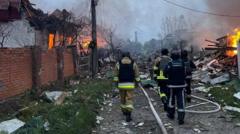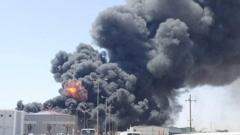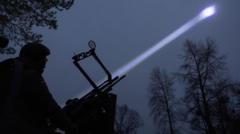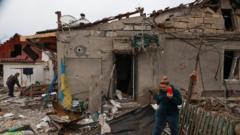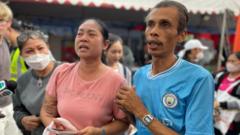The war in Ukraine has led to a nationwide sleep deprivation crisis, exacerbating psychological distress among its citizens. Experts say drone attacks are a significant factor in the rising mental health issues, urging immediate interventions.
Sleep Crisis: The Psychological Toll of War in Ukraine

Sleep Crisis: The Psychological Toll of War in Ukraine
Residents face chronic sleep deprivation amid ongoing conflict and drone attacks as anxiety rises.
In the early days of the war, many Ukrainians turned to social gatherings, including drinking, as a way to cope with stress. 22-year-old Sofia Tsarenko from Dnipro initially relied on alcohol to diminish her anxiety but soon faced increasing levels of irritability and insomnia. After exhausting her usual coping mechanisms, she discovered relief through antidepressants and sleep aids, stating, “I felt like angels were taking me to sleep.”
The ongoing conflict has far-reaching consequences. Beyond the physical casualties arising from Russia's invasion, the psychological damage is profound. Recent data highlights that three years of warfare have resulted in widespread mental health challenges, with sleep deprivation becoming a significant concern. According to experts and psychologists, nearly nightly drone assaults have created an environment rife with stress and fear, keeping countless Ukrainians awake long into the night.
As reports detail the intensification of drone strikes—particularly in urban areas—these nighttime intrusions are adding to the mental strain of the populace. According to Ukrainian officials, the resurgence of attacks coincides with U.S.-mediated peace discussions, suggesting a spiraling cycle of violence that heightens civilian anxiety.
Experts emphasize the severe repercussions of chronic sleep deprivation, commonly referred to as "sleep debt." This condition can trigger a range of psychological issues from anxiety and irritability to more severe mental health disorders, calling for immediate attention to this increasing crisis.
With the situation continuously evolving, the intersection of warfare and mental health remains a critical concern for Ukrainians, urging a reevaluation of support systems amidst the unrelenting conflict.
The ongoing conflict has far-reaching consequences. Beyond the physical casualties arising from Russia's invasion, the psychological damage is profound. Recent data highlights that three years of warfare have resulted in widespread mental health challenges, with sleep deprivation becoming a significant concern. According to experts and psychologists, nearly nightly drone assaults have created an environment rife with stress and fear, keeping countless Ukrainians awake long into the night.
As reports detail the intensification of drone strikes—particularly in urban areas—these nighttime intrusions are adding to the mental strain of the populace. According to Ukrainian officials, the resurgence of attacks coincides with U.S.-mediated peace discussions, suggesting a spiraling cycle of violence that heightens civilian anxiety.
Experts emphasize the severe repercussions of chronic sleep deprivation, commonly referred to as "sleep debt." This condition can trigger a range of psychological issues from anxiety and irritability to more severe mental health disorders, calling for immediate attention to this increasing crisis.
With the situation continuously evolving, the intersection of warfare and mental health remains a critical concern for Ukrainians, urging a reevaluation of support systems amidst the unrelenting conflict.

